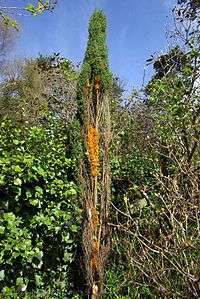Gymnosporangium clavariiforme
| Gymnosporangium clavariiforme | |
|---|---|
 | |
| G. clavariiforme telia on Juniper | |
| Scientific classification | |
| Kingdom: | Fungi |
| Division: | Basidiomycota |
| Class: | Pucciniomycetes |
| Order: | Pucciniales |
| Family: | Pucciniaceae |
| Genus: | Gymnosporangium |
| Species: | G. clavariiforme |
| Binomial name | |
| Gymnosporangium clavariiforme (Wulfen) DC. (1805) | |
| Synonyms[1] | |
|
Tremella clavariiformis Wulfen (1786) | |


Gymnosporangium clavariiforme is a species of rust fungus which alternately infects Juniperus and hawthorns.[2]
In junipers,the primary hosts, G. clavariiforme produces a set of orange tentacle-like spore tubes called telial horns. These horns expand and have a jelly like consistency when wet.[3] The spores are released and travel on the wind until they infect a hawthorn tree.
On the secondary hosts, the fungus produces yellowish depressions on the leaves. It also infects the fruit, which grows whitish tubes like a Medusa head. These are the spore tubes. The spores must then infect a juniper to complete the life cycle.
The fungus does not cause serious damage to junipers, but hawthorns can suffer serious loss of haw production due to the effects of the fungus.
References
- ↑ "Gymnosporangium clavariiforme (Wulfen) DC. 1805". MycoBank. International Mycological Association. Retrieved 2011-07-08.
- ↑ Kirk PM, Cannon PF, Minter DW, Stalpers JA (2008). Dictionary of the Fungi (10th ed.). Wallingford, UK: CABI. ISBN 978-0-85199-826-8.
- ↑ SORTING OUT GYMNOSPORANGIUM SPECIES - The aecial stage, Field Mycology Volume 7(4), October 2006, Brand, Brand and Shattock.
Further reading
- Phillips, D. H., & Burdekin, D. A. (1992). Diseases of Forest and Ornamental Trees. Macmillan.
- Scharpf, R. F., ed. (1993). Diseases of Pacific Coast Conifers. USDA Forest Service Agricultural Handbook 521.